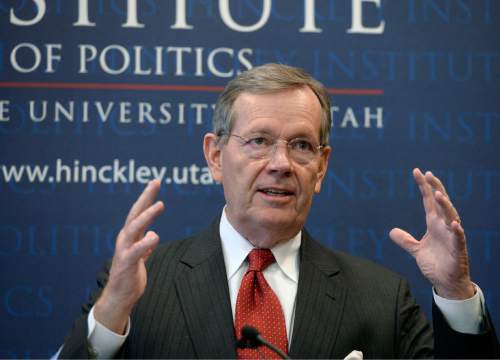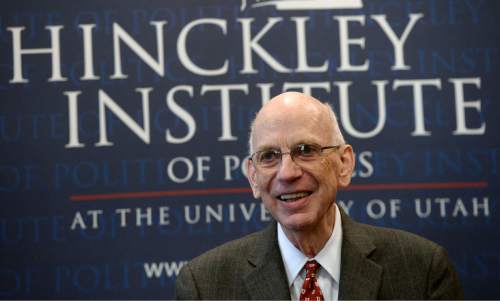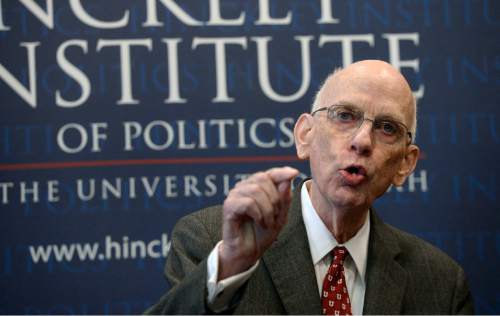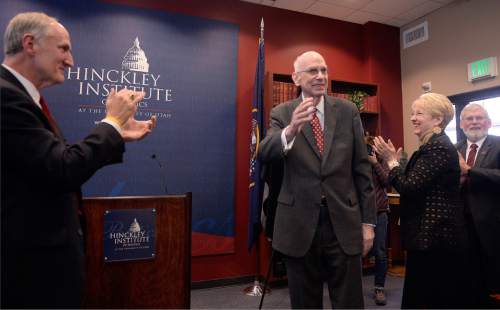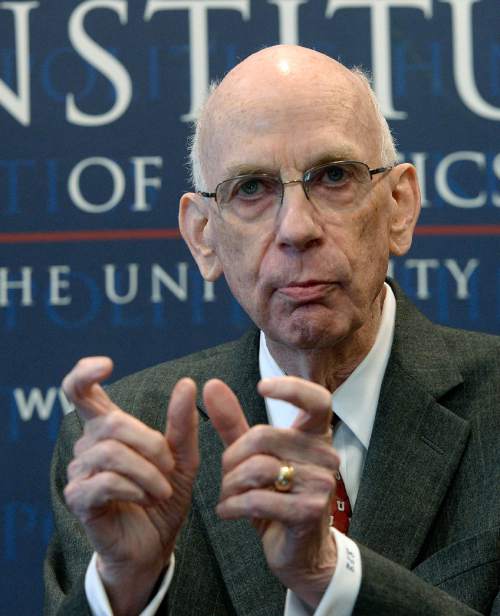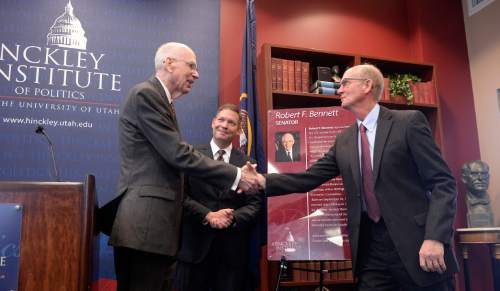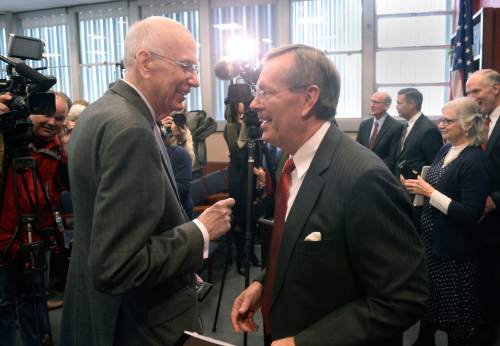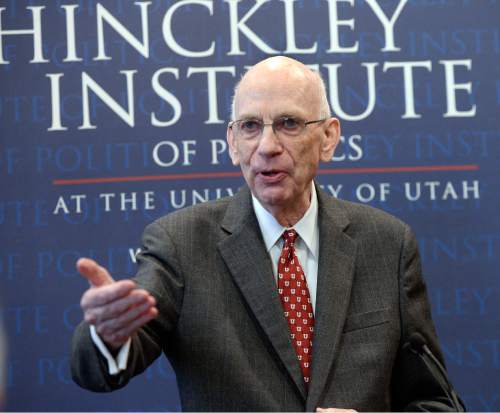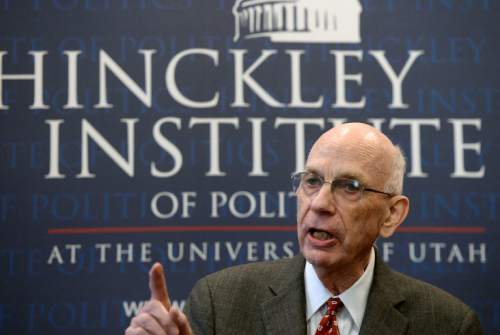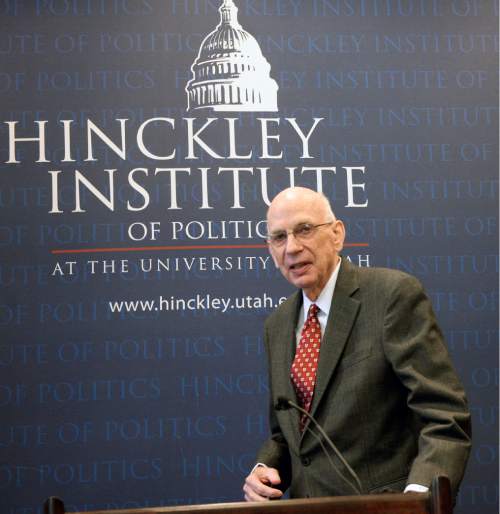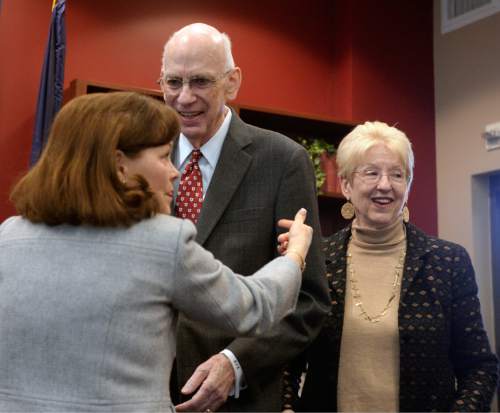This is an archived article that was published on sltrib.com in 2016, and information in the article may be outdated. It is provided only for personal research purposes and may not be reprinted.
Former Sen. Bob Bennett, 82, looking pale and somewhat frail after a successful bout with cancer, focused on youth and the future of politics Wednesday as he was inducted into the Hinckley Institute of Politics' Hall of Fame at the University of Utah.
The second Bennett to be so honored by the institute — his father, former Sen. Wallace F. Bennett, was the first — Bob Bennett quoted Robert Hinckley, who founded the Hinckley Institute and whose son was present at the ceremony: "Our young, best minds must be encouraged to enter politics."
Bennett said he is "optimistic" that in this "key moment in the history of civilization" young people involved in politics will be up to responding to current challenges.
The former businessman-turned-politician-turned-college instructor said one of the things he tries to drill into his U. students is the phrase "forever tentative."
"I tell them at the beginning of the course, 'You have opinions, and you have principles and concepts in politics, and you should have. But hold them forever tentative. Be prepared to change in the face of new information,' " Bennett said. "Be prepared to adjust when new information comes along and shows you that maybe that concept wasn't exactly right as you held on."
Bennett also spoke of his hope that bright young people can help bring the U.S. Senate into the 21st century.
"I say with some facetiousness, but I think accuracy, the Senate is an interesting place, superbly structured to deal with the problems of the 19th century," he said, "and we need the best young minds that can react to the realities of the information revolution and to the geopolitical changes that have occurred for the first time in the world."
Bennett's service during three terms in the Senate, from 1993 to 2011, was lauded by U. President David Pershing, former Utah Gov. Mike Leavitt and political science professor Tim Chambless.
Pershing spoke of Bennett's accomplishments and personal contributions to the U., beginning with his service as student body president in 1956 and later awarding funding to the university and state.
"He's never been one to seek out attention, to claim accomplishments," Pershing said, "but we all know that during his service as senator, he was a wonderful, wonderful friend for the state of Utah and for all of us."
Leavitt said Bennett personifies the "blend of qualities" it takes to be a successful politician and a Hall of Fame inductee.
A balance between statesmanship, "doing the right thing for the right reason," and gamesmanship, "the capacity to navigate circumstances where many people want different things at the same time," is what the office calls for, Leavitt said, and Bennett rose to the occasion.
When the two were serving in office at the same time — Bennett in Washington, D.C., and Leavitt in Utah — he said Bennett would step forward during times of controversy and vote for what he felt was right "at his own political peril."
As a politician, Bennett was trustworthy, had "properly placed loyalty" and acted in a dignified manner.
Leavitt compared the former senator to the Dalai Lama for his gentleness and patience with people.
"I have never seen Bob Bennett lose his temper," Leavitt said. "I have no memory of him ever speaking in a harsh voice. His influence and his tone and his manner is what gave him power. And, I might add, his sense of humor."
He said spontaneity also sets Bennett apart from others. Leavitt recalled an experience where he and Bennett were attending the "second or third" black-tie event in a month, and they had a "without words understanding" that they needed to duck out to a movie.
"And so with a bit of conspiring, we spontaneously, between the hors d'oeuvres and the entree, made an escape," Leavitt said, "and went to the movie in our tuxedos and had a memorable night."
Chambless said students favored Bennett when working with him in D.C. because of "his welcoming manner, his thoughtful answers, his candid insights."
Bennett advises young people to develop a broad set of skills and experience, and as much as he likes to encourage students to get involved in politics, it's not for everyone.
"Some of the best examples — or worst examples if you prefer — [are] people who have cut corners with their consciences in order to stay in office. People are afraid if they left office they couldn't support their families." Bennett advised students, "Find something that you can go back to, something that you can turn to so that you aren't living from one election to the next, from one fundraiser to the next. ... Have a position of some independence."


